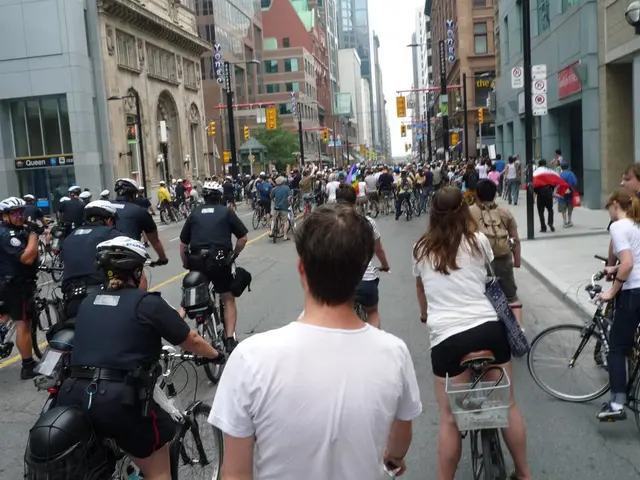Southwest Region's Leader in Unhappiness: Karlsruhe City
Baden-Württemberg Shines in Prosperity, But Falls Short in Happiness
When it comes to economic might, life expectancy, or quality of life, Baden-Württemberg often dominates. However, when it comes to personal happiness, the Southwestern region has a different score: a recent survey by the South German Class Lottery (SKL) shows that Mannheim, Stuttgart, and Freiburg rank 17th, 19th, and 21st, respectively, among the 40 largest German cities with over 200,000 inhabitants. Residents in Karlsruhe are the least content, with the city coming in 38th place, revealing a significant disparity between feelings and reality.
Surprisingly, residents of Karlsruhe have many reasons to rejoice, given objective criteria such as living conditions, demographics, prosperity, and environmental quality, which rank the city highest among the 40 cities surveyed. Other cities in the Southwest, however, also underperform, with people less content than expected based on objective criteria.
Researchers attribute these findings to immaterial aspects like a sense of community, daily stress, and personal identification with the place of residence. In other words, life satisfaction doesn't solely depend on socio-economic factors, but also on subjective aspects like a strong community and emotional well-being.
Kassel in northern Hesse takes the title of the happiest city in Germany, with Krefeld in North Rhine-Westphalia, Düsseldorf, and Augsburg following closely. The ranking is based on a survey of 23,468 residents in 40 large cities about life satisfaction. Overall, the survey shows a positive trend, with most cities seeing an increase in life satisfaction, except for a few experiencing minor decreases.
The positive trend is attributed to the replacement of data from 2021, which included the COVID-19 pandemic, with data from 2022.
Why Karlsruhe Struggles with Satisfaction
The discrepancy between the subjective well-being of residents in Karlsruhe and the city's superior objective quality of life might be explained by several factors:
- Subtle misalignment between subjective and objective measures of well-being
- The impact of social and community participation
- The effects of high expectations and comparisons
- The influence of individual and cultural differences
- Local specificities unique to Karlsruhe, such as housing shortages or a clash between academic and industrial communities
Implications for Germany
While Germany performs well on objective criteria such as healthcare, infrastructure, and safety, subjective well-being is influenced by factors like social participation, expectations, and local culture. Understanding these factors can lead to improved policies and strategies for foster subjective well-being and minimize the discrepancy between objective and subjective quality of life.
| Factor | Objective (Karlsruhe) | Subjective (Life Satisfaction) ||-------------------------------|---------------------------|-------------------------------|| Healthcare | Very High | Subjective assessments || Infrastructure | Excellent | Varies among residents || Social Participation | Extensive | A balance between formal and informal engagement necessary || Economic Stability | Strong | Sensitive to expectations || Local Community Dynamics | Generally positive | Local issues may reduce satisfaction |
In the context of subjective well-being, cities in the home-and-garden region of Baden-Württemberg underperform, despite excelling in objective criteria such as living conditions, prosperity, and environmental quality. This disconnect might be due to factors like a sense of community, daily stress, and personal identification with the place of residence, as seen in Karlsruhe, which despite ranking highest in objective quality of life, has lower life satisfaction (sustainable-living).
To improve subjective well-being and minimize the discrepancy between objective and subjective quality of life in cities like Karlsruhe, understanding the role of factors such as social participation, expectations, and local culture becomes crucial (sustainable-living, lifestyle).






